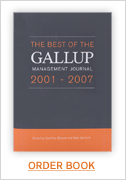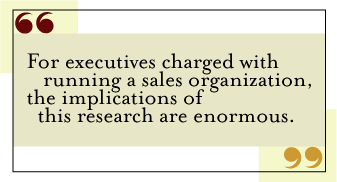A recent article published by CRM magazine reported a surprising decline in e-commerce customer satisfaction scores. The data, drawn from the American Customer Satisfaction Index Annual E-Commerce Report, showed a slump in scores after two years of progressive increases.
 |
E-commerce titans such as eBay, Amazon.com, and Charles Schwab all took substantial hits. Schwab saw a 5.3% reduction in its customer satisfaction scores, while auction leader eBay had a 4.8% reduction, and Amazon.com dropped 4.5 percentage points. This news -- which is not the kind of news senior executives like to receive -- has significant implications for sales and marketing executives in any industry, even those in old-economy, manufacturing sectors.
You can picture the executive hand-wringing taking place at these e-commerce giants. Few scores are taken as seriously as customer satisfaction indices, and precipitous declines are usually followed by pointed questions such as "How did this happen?" and "What are we going to do about it?" After all, for more than half a century, we have lived in an era in which the "customer is king."
If satisfaction scores are going down, something must be wrong. Isn't the goal of a business to achieve 100% ratings? Shouldn't your company strive for the highest customer satisfaction rating it can get?
No, it shouldn't.
First, let's be clear that the real goal of a publicly traded company is to achieve sustainable growth in income. Stock analysts love companies that are able to grow their income quarter after quarter, year after year -- especially when revenue growth is a primary factor driving income growth. Sustainable growth is the most reliable driver of shareholder value.
Intuitively, it's easy to believe that high customer satisfaction scores correlate with sustainable growth. Conversely, significant drops in scores should link to declines in growth. And if two companies are competing in the same marketplace, wouldn't you expect the company with the highest satisfaction score to beat out the other company?
Not necessarily. Customer satisfaction scores do not necessarily link to sustainable growth. So whatever hand-wringing is going on at eBay, Amazon.com, or Charles Schwab may be in vain.
Perplexed?
If you're confused by this, you're not alone. It's almost impossible to believe that a company's future prospects aren't tied in some way to the strength of its customer relationships. Admittedly, not every company or executive believes this or acts this way. P.T. Barnum is rightly credited with many marketing breakthroughs, but he's also credited with saying, "There's a sucker born every minute." And most sources suggest he would have agreed with that.
Not many reputable companies would have the nerve to etch that sentiment into their corporate mission statements (although some might as well). Sure, Barnum's sentiment is uncomfortable, but his success over time was unquestionable. If customer satisfaction scores don't mean much, have companies collectively exaggerated the importance of their customers?
Not at all, according to Gallup Organization researchers William J. McEwen, Ph.D., and John Fleming, Ph.D. The connection that companies have with their customers is extremely important, but traditional customer satisfaction measures aren't an effective way to gauge the strength of that connection.
Backed by Gallup case studies and extensive Gallup research, McEwen and Fleming concluded in their GMJ article "Customer Satisfaction Doesn't Count" that companies chasing the coveted prize of high customer satisfaction are "pursuing the wrong goal. That's right. Regardless of how high a company's satisfaction levels may appear to be, satisfying customers without creating an emotional connection with them has no real value. None at all." (See "Customer Satisfaction Doesn't Count" in the "See Also" area on this page.)
Through extensive research, Gallup devised a metric that quantifies the strength of these emotional attachments, or customer engagement. And, as it turns out, customer engagement scores have a very strong relationship with sustainable growth.
McEwen and Fleming cited several case studies that revealed that extremely satisfied customers were just as likely to stop doing business with a bank as were customers who were less satisfied. Furthermore, at a leading supermarket chain, extremely satisfied customers, on average, spent no more than less satisfied customers. In other words, financial outcomes were not affected by customer satisfaction scores.
McEwen and Fleming noticed a difference in financial outcomes only when they isolated customers who were both extremely satisfied with the company and emotionally connected to the company with which they were doing business. At the supermarket chain, customers who were both extremely satisfied and emotionally connected visited the chain more often and spent more each month. The pattern was the same at the retail bank: Customers who were extremely satisfied and emotionally engaged were far less likely to leave than customers who were merely satisfied but lacked an emotional connection.
 |
What this means for sales forces
For executives charged with running a sales organization, the implications of this research are enormous. Emotional connections that improve financial outcomes are hard to create on the basis of a product or service alone, no matter how outstanding that product or service is. Products and services are easily duplicated. On the other hand, a sales force can make a significant difference in creating customer engagement -- one that is exceedingly difficult for competitors to mimic.
One of the characteristics of engaged customers is that they are much more willing to act as advocates by referring others to your company's product or service. Simply put, engaged customers help companies get other customers.
To understand how this concept works, think about how you use ATMs. For most of us, they have become a routine part of the way we bank; we find them efficient and convenient. When we need cash, we're happy to see one on a nearby corner. But as satisfied as you may be with the service ATMs provide, when is the last time you recommended a particular machine to one of your friends or colleagues? Or recommended your bank, for that matter? ATM users can be perfectly satisfied but not engaged.
In companies where salespeople interact directly with customers, engagement derives from the relationship that develops between customers and the people who take care of them. When Gallup looked at customer engagement scores broken down by sales territory, we found enormous differences in the results achieved by individual salespeople. Sales managers often look at how much a particular rep is selling; few know or understand whether their reps are actually increasing customer engagement each year.
In our continuing evaluation of the factors that help build world-class sales organizations, customer engagement is becoming an increasingly important and reliable measuring stick to evaluate the quality and progress of the sales organization. In fact, almost all of the strategies you use to boost sales must be viewed against that measuring stick.
For example, if you increase the size of your sales force but fail to increase the number of engaged customers, either you haven't adopted the right strategy or you haven't executed it well. Similarly, if you reduce the number of sales managers and end up reducing customer engagement as a consequence, you have actually damaged your prospects for future growth.
Sales managers often have to make tough resource decisions. From time to time, we all find ourselves in the predicament that executives at eBay, Amazon.com, and Charles Schwab now face. They need to be asking questions -- not about their declining customer satisfaction scores, but rather about what has been happening to customer engagement. If engagement is rising, they are on the right track. If not, then they really do have something to worry about. In tough competitive markets, no one can afford the mistake of worrying about the wrong measures.